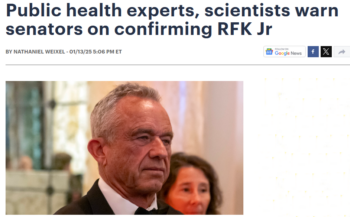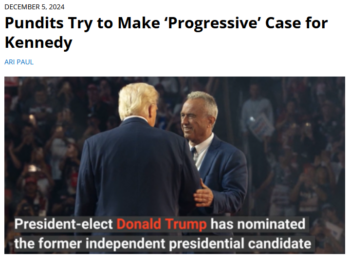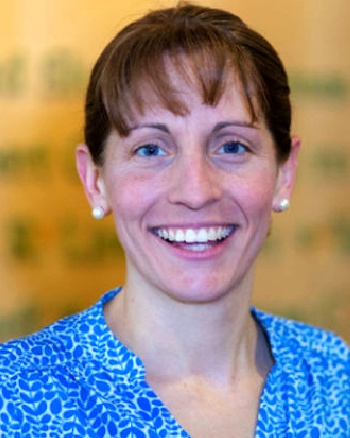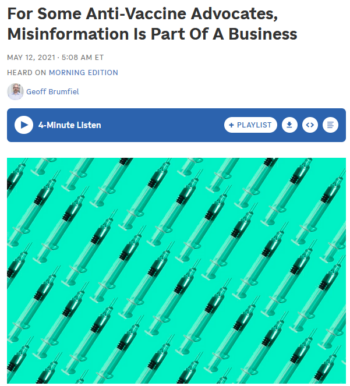Janine Jackson interviewed Dartmouth-based Anne Sosin about Robert F. Kennedy Jr. and rural health for the February 7, 2025, episode of CounterSpin. This is a lightly edited transcript.

The Hill (1/13/25)
Janine Jackson: A Senate panel voted narrowly this week to advance the nomination of Robert F. Kennedy Jr. for secretary of the Department of Health and Human Services. Kennedy has been emphatically opposed by a range of public health experts for reasons including, but not limited to, his stated belief that vaccines have “poisoned an entire generation of American children.” Yes, his children are vaccinated, but he wishes he “could go back in time” and undo that.
Also, that Covid-19 is targeted to attack Caucasians and Black people, while Ashkenazi Jews and Chinese are most immune; that the HPV vaccine causes a higher death risk than the cancer it prevents; that fluoride causes IQ loss; that Vitamin A and chicken soup are cures for measles; that AIDS is not caused by HIV; and that we had almost no school shootings until the introduction of Prozac.
Nevertheless, Kennedy may soon be overseeing Medicare, Medicaid and the Affordable Care Act, coordinating the public health response to epidemics, as well as the approval process for pharmaceuticals, vaccines and supplies.
Our guest says RFK Jr is absolutely a threat to public health, but nixing his nomination is not the same thing as meaningfully engaging the problems that lead people to support him.
Anne Sosin is a public health researcher and practitioner based at Dartmouth College. She joins us now by phone. Welcome to CounterSpin, Anne Sosin.
Anne Sosin: Thank you so much for having me on the show.

FAIR.org (12/5/24)
JJ: There are a number of people, in lots of places, who have centered their lives perforce on concerns around food and health and medicine. And they see a guy who seems to be challenging Big Pharma, who’s saying food additives are problematic, who’s questioning government agencies. There are a lot of people who are so skeptical of the US healthcare and drug system that a disruptor, even if it’s somebody who says a worm ate his brain—that sounds better than business as usual. And so that’s leading some people to think, well, maybe we can pick out some good ideas here, maybe. But you think that is the wrong approach to RFK Jr.
AS: I think that that’s misguided. Certainly, there are some people who see RFK as a vehicle for championing their causes. And there are other people who think that we should seek common ground with RFK, that we should acquiesce, perhaps, on certain issues, and then work together to advance some other causes.
And I think that that’s misguided. I think we need to recognize what’s given rise to RFK and other extreme figures right now, but we need to make common cause with the communities that he’s exploiting in advancing his own personal and political goals.
JJ: And in particular, you’re thinking about rural communities, which have played a role here, right? What’s going on there?
AS: Yes. My work is centered in rural communities right now, and I think we need to understand the political economy that’s given rise to RFK and other figures—the social, economic, cultural and political changes that have given him a wide landing strip in rural places, as well as some of the institutional vacuums that RFK and other very extreme and polarizing figures are filling.
JJ: Expand on that, please, a little.

Anne Sosin: “Resistance to public health measures often, in my view, reflects unmet need.”
AS: So we’re seeing growing resistance in some places, including rural communities, to public health and interventions that have long been in place, including vaccination and fluoridation. And resistance to public health measures often, in my view, reflects unmet need.
Sometimes those needs are material. We see that people resist or don’t follow public health programs or guidance because they don’t have their material needs met. And those material needs might be housing, paid leave or other supports that they need. But the unmet need might also be emotional or affective, that some people may resist out of a sense of economic or social dislocation, a feeling of invisibility, or something else. And those feelings get expressed as resistance to public health measures that are in place.
And so understanding and recognizing what those unmet needs are is really important. And then thinking about how do we address those needs in ways that are productive, and don’t undermine public health and healthcare, is really important.
JJ: Vaccinations are obviously a big concern here, particularly as we may be going into another big public health concern with bird flu. So the idea that vaccines cause disease is difficult to grapple with, from a public health perspective. Vaccines can’t be a “choose your own adventure” if they’re going to work societally. And it almost seems like, around vaccination, we’re losing the concept of what public health means, and how it’s not about whether or not you decide to eat cheese, you know? There’s kind of a public understanding issue here.
AS: I think you’re correct. I think we’ve seen, just in the US, an increasing DIYification of public health, a loss of the recognition that public health means all of us. Public health is the things that we do together to advance our collective health. And the increased focus on individual decision-making really threatens all of us.

NPR (5/12/21)
And we look for it around vaccination: We have seen very well-funded initiatives to undermine public confidence in vaccination over the last several years. There has been a lot of money spent to dismantle public support and public confidence in vaccination and other lifesaving measures. And it really poses a grave threat, as we think about not only novel threats like H5N1, but also things that have long been under control.
JJ: Finally, I took a quick look at major national media and rural healthcare, and there wasn’t nothing. I saw a piece from the Dayton Daily News about heart disease in the rural South, and how public health researchers are running a medical trailer around the area to test heart and lung function. I saw a piece from the Elko Daily Free Press in Nevada about how Elko County and others are reliant on nonprofits to fill gaps in access to care, and that’s partly due to poor communication between state agencies and local providers.
And I really appreciate local reporting; local reporting is life. But some healthcare issues, and certainly some of those that would be impacted by the head of HHS, are broader, and they require a broad understanding of the impact of policy on lots of communities. And I just wonder, is there something you would like to see news media do more of that they’re missing? Is there something you’d like them to see less of, as they try to engage these issues, as they will, in days going forward?
AS: Certainly local coverage is essential, and I’m really pleased when I see local coverage of the heroic work that many rural healthcare providers and community leaders are delivering. We see very creative and innovative work happening in our rural region, in our research, in our community engagement. And so it’s very encouraging when I see that covered.
But all of the efforts on the ground are shaped by a larger policy landscape and a larger media landscape, larger political landscape. And what we see, often, is efforts to undermine the policies that are critical to preserving our rural healthcare infrastructure. We see well-funded media efforts to erode social cohesion, to undermine our community institutions, to sow mistrust in measures such as vaccination. We see other work to harden the divisions between urban and rural America, and within rural places.
And so I hope that media will pay attention to the larger forces that are shaping the landscape of rural life, and not just see the outcome. It’s easy to take note of the disparities between urban and rural places, but it’s much harder to do the deep and complex work of understanding the forces that generate those uneven outcomes across geographic differences.
JJ: All right, well, we’ll end on that important point.
We’ve been speaking with Anne Sosin, public health researcher and practitioner based at Dartmouth College. Anne Sosin, thank you so much for joining us today on CounterSpin.
AS: Thank you for the invitation.
This content originally appeared on FAIR and was authored by Janine Jackson.
Janine Jackson | Radio Free (2025-02-11T22:33:29+00:00) ‘We Need to Understand the Political Economy That’s Given Rise to RFK’CounterSpin interview with Anne Sosin on RFK Jr. and rural health. Retrieved from https://www.radiofree.org/2025/02/11/we-need-to-understand-the-political-economy-thats-given-rise-to-rfkcounterspin-interview-with-anne-sosin-on-rfk-jr-and-rural-health/
Please log in to upload a file.
There are no updates yet.
Click the Upload button above to add an update.